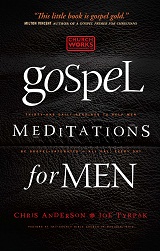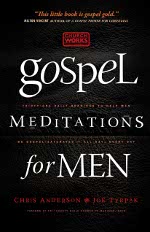Gospel Meditations for Men: Samples from the Book
 Gospel Meditations for Men is a book published recently by ChurchWorks Media and authored by Chris Anderson and Joe Tyrpak. Copies are available at ChurchWorksMedia.com.
Gospel Meditations for Men is a book published recently by ChurchWorks Media and authored by Chris Anderson and Joe Tyrpak. Copies are available at ChurchWorksMedia.com.
Day 5—The Basis For True Humility
Read Isaiah 6
Woe is me! For I am lost…for my eyes have seen the King, the Lord of hosts. Isaiah 6:5
Humans—and perhaps men in particular—are nothing if not proud. We love ourselves, promote ourselves, and defend ourselves. Arrogance is sewn into our fallen nature. The problem is this: God detests pride. Proverbs 16:5 says that the proud person (not just pride as an impersonal concept) is an abomination to God. James 4:6 teaches that God actively opposes the proud. Pride is dangerous and foolish. Spurgeon described pride as “a groundless thing” and “a brainless thing” and “the maddest thing that can exist” (in a sermon preached on August 17, 1856).
How, then, can we cultivate humility? Is it a way of walking or speaking? Is it an “Aw, shucks” personality? A self-loathing? On what is true humility based? Scripture answers these questions definitively in Isaiah 6:1-7. True humility begins with a right estimation of God.
Our humility grows when we recognize God’s unrivaled majesty. The prophet Isaiah was given the unfathomable privilege of seeing God’s majesty (6:1)—the glory of the pre-incarnate Christ, according to John 12:41! Jehovah was enthroned in the temple, which shook beneath His sovereignty (6:1, 4). His robe had a vast train which testified of His splendor (6:1). He was identified as “the King” and “the Lord of hosts” (think “Commander in Chief,” 6:5). His reign outshone the recently ended reign of King Uzziah (6:1). Whereas Uzziah had died, Jehovah lives. Whereas Uzziah’s reign was limited in time and sphere, Jehovah’s is infinite. There is no King like Christ. We too would be humbled if we would see God in all of His majesty.
 In 1959 RCA releasedFifty Million Elvis Fans Can’t Be Wrong—Elvis’ Gold Records Vol. 2.
In 1959 RCA releasedFifty Million Elvis Fans Can’t Be Wrong—Elvis’ Gold Records Vol. 2.

Discussion